Civil Liberties, Civil Rights, Climate Change, Human Rights, NSA Spying, Supreme Court, Surveillance
Podcast: Play in new window | Download


The Center for Climate Integrity
Today, we’re delving into a legacy of deception and destruction. For more than 50 years, Big Oil companies like ExxonMobil, Chevron, and BP have known that burning fossil fuels would raise global temperatures. Yet, instead of taking responsibility or warning the public, they have orchestrated campaigns of denial, disinformation, and delay.
As a result, we are living with unprecedented climate disasters. Following the hottest year on record in 2023, extreme weather events have intensified, from record-breaking wildfires scorching California and Canada, to catastrophic hurricanes pounding the Gulf Coast. During this past June, nearly 5 billion people globally faced intense heat over nine days, with more than 60% of the world’s population encountering temperatures made at least three times more likely by climate change. These events not only devastate ecosystems and communities, but they also cost taxpayers billions of dollars in damage and recovery.
Guest – Corey Riday-White, Managing Attorney at the Center for Climate Integrity, an organization that is fighting to hold Big Oil accountable for its deceit. The Center is supporting litigation efforts in several states, aiming to force fossil fuel companies to pay for the damage they’ve caused. Let’s hear more about their approach, and how the legal system might be used to confront this ongoing climate crisis.
—-


Surveillance Dragnet: Geofence Warrants
Recently, the Fifth Circuit Court of Appeals handed down a landmark decision in U.S. v. Jamarr Smith, holding that geofence warrants are “categorically prohibited by the Fourth Amendment.” What is a Geofence Warrant? They compel companies such as Google to hand over data on every device in a particular geographical area over a set period of time. Not surprisingly they are a controversial tool in law enforcement’s investigative arsenal.
Privacy experts argue they amount to a dragnet search that violates the privacy of countless innocent individuals. Proponents, on the other hand, see them as necessary for solving crimes in our digital world. The Fifth Circuit ruling is a major development in the ongoing debate over privacy and mass surveillance.
Guest – Alan Butler, the executive director of the Electronic Privacy Information Center or EPIC, in Washington, DC. EPIC has been at the forefront of legal battles to improve data protection standards to protect individual rights in the rapidly advancing surveillance state. Alan Butler is Chair of the Privacy and Information Protection Committee of the American Bar Association Section on civil Rights and Social Justice. He has authored briefs on behalf of EPIC in significant privacy cases, including an amicus brief in Riley v. California that was cited in the Supreme Court’s unanimous landmark ruling that the warrantless search and content seizure of cell phones during an arrest is unconstitutional.
Music out: The Down Hill Strugglers – Abandoned Orchards That Grow

———————-
Climate Change, Gaza, genocide, Targeting Muslims
Podcast: Play in new window | Download


Israel’s War As A Catalyst For World War
One issue flowing from the Israeli-Palestinian war, at first pretty much ignored, is the danger of the war widening. And as Israel’s war in Gaza drags on, with no end yet in sight, the threat of a much wider war grows stronger. Already the war has resulted in military action in Syria and Iraq, by forces loyal to Iran; U.S. military facilities have been targeted in Iraq by Iranian backed forces; the United States and Great Britain are now regularly bombing Houthi military installations in response to the Houthis militarily disrupting the free flow of shipping in the Gulf region, on behalf of their support for Palestine; and, there are now daily clashes between Hezbollah in Lebanon, and Israel, across their shared border.
So far, the adversaries have been careful to not go beyond an unspoken, but generally recognized “tipping point,” so as not to bring about open nation-on-nation warfare throughout the region. But a “slippery slope” has now been created that many fear could bring about what would amount to a “world war”, even if confined only to that part of the world. And if that happens, who knows how many other nations in the Middle East would end up drawn into such a wider war.
Guest – Richard Becker is the Western Regional Coordinator of the “Act Now to Stop War and End Racism” coalition, or ANSWER. He is the author of the highly praised book, Palestine, Israel, and the U.S. Empire, published in 2013, with an up-dated edition of the book about to be released, as well. He is also the author of the book entitled, The Myth of Democracy and the Rule of the Banks. Richard Becker is also a national leader in the Party for Socialism and Liberation.
—-


Climate Change And Legal Analysis
While it has been all too slowly, the reality of climate change and what it means for life on our planet, for human lives and the lives of the multitude of other life forms we share this planet with, has become clearer to all who’ve not buried their heads in the sand and closed their eyes and minds to this deadly reality.
For a few decades now we humans have been paying more and more attention to the issue, and have actually instituted some measures aimed at holding climate change in check, but so far with pitifully little effect. In fact, despite these more recent efforts, those greenhouse gases just keep reaching for the sky in greater and greater amounts every year. Is it hopeless? That is, are we humans hopelessly unwilling and unable to do what the science on the matter makes clear must be done if we are not to find ourselves, rather soon, on our way to extinction? Are there, in fact, things we could and should be doing that would actually work?
Guest – Professor Eleanor Stein is a climate change, environmental justice and human rights activist and advocate. She teaches climate change and human rights at the State University of New York, at Albany, and has just recorded a Continuing Legal Education session on this subject for the CUNY Law School. In addition, she facilitates international forums on climate change and energy. And for years, Professor Stein was an Administrative Law Judge at the NY state agency that regulates the energy industry. She guided state policy on recovery from Superstorm Sandy ten years ago. In this regard, her work centered on mediating processes to bring solar and wind energy to the state at scale, at speed, and with justice.
Hosted by attorneys Jim Lafferty and Maria Hall

——————————–
Civil Liberties, Civil Rights, Climate Change, Human Rights, Political Prisoner, Prison Industry, U.S. Militarism
Podcast: Play in new window | Download
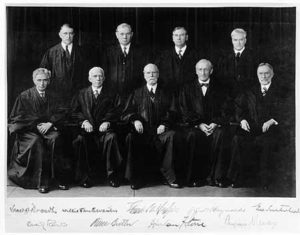
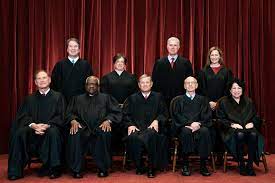
Far Right Supreme Court Decisions Not Seen Since 1931
During its last term, the Supreme Court demonstrated that it is the most right-wing court since 1931. In cases involving reproductive rights, entanglement of church and state, the right to carry guns, and the ability of congressionally-mandated administrative agencies to regulate climate change, the high court’s conservative members handed down reactionary rulings. The court has agreed to hear a case next term that could radically change our electoral system.
Guest – Stephen Rohde is an author and social justice advocate who practiced civil rights and constitutional law for more than 45 years, including representing two men on California’s death row. He is the former chair of the ACLU Foundation of Southern California and former national chair of Bend the Arc, a Jewish Partnership for Justice. He is also a board member of Death Penalty Focus.
—-
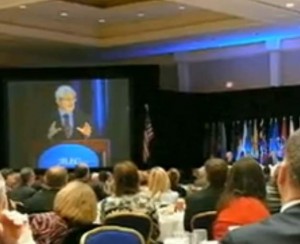
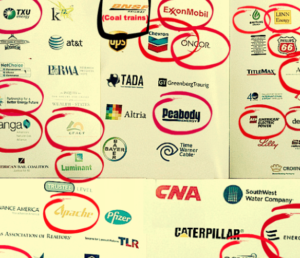
ALEC: Five Decades of Government Influence
The United States underwent a “public interest” revolution in the 1960s and early 1970s. In the first half of the ’60s, Congress passed precedent-setting environmental laws, including the Clean Air Act, the Clean Water Act, and the Water Quality Act. And in just three years, from 1969 to 1972, the federal government adopted a raft of new environmental, public health, workplace and consumer protections and established new agencies to administer them, including the Environmental Protection Agency and the Occupational Safety and Health Administration.
That revolution sparked a counterrevolution that is still reverberating today. Wealthy conservatives, corporations and libertarian foundations poured money into new think tanks and advocacy groups, including the Heritage Foundation and Charles Koch’s Cato Institute. A less-well-known group, the American Legislative Exchange Council, was founded around the same time. It goes by its acronym, ALEC.
Unlike Heritage and Cato, ALEC—a network of nearly 300 corporations, trade groups, law firms, and libertarian foundations—operates at the state level. The group provides state legislators with a variety of ready-made bills that, among other things, roll back voting rights, thwart efforts to address climate change, and bolster corporate profits.
State lawmakers introduced nearly 2,900 bills based on ALEC’s recommendations from 2010 through 2018, according to an investigation by USA Today, the Arizona Republic and the Center for Public Integrity. More than 600 of them became law.
Lately ALEC has been coaching state legislators on how to spin the recent Supreme Court decision overturning Roe v. Wade. ALEC has also been working behind the scenes to amplify the false GOP narrative on voter fraud. Writer Elliott Negin has been following ALEC off and on for the last decade, and he recently posted an essay that explains in detail how ALEC turns disinformation into law. We are fortunate to have Elliott as our guest today.
Guest – Elliott Negin is a senior writer at the Union of Concerned Scientists, a national science advocacy organization. Prior to joining UCS in 2007, he was the Washington communications director for the Natural Resource Defense Council, a former news editor at National Public Radio, the managing editor of American Journalism Review, and the editor of Nuclear Times and Public Citizen magazines.

—————————————————
Civil Liberties, Civil Rights, Climate Change, Human Rights, Surveillance
Podcast: Play in new window | Download
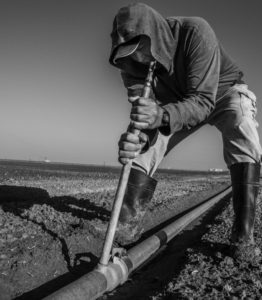
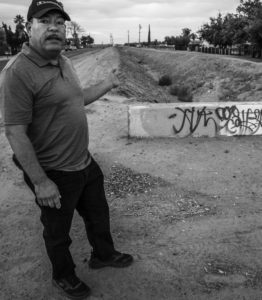
Illegal People: How Globalization Creates Migration and Criminalizes Immigrants
California has a water crisis that is rooted in racism. About 1 million Californians in 130 communities still do not have access to clean, safe drinking water. Most of these people live in rural areas primarily populated by farmworker families.
This inequality can be traced to the Great Migration of African Americans from the South to the North at the beginning of the 20th Century. Met with discriminatory real estate practices, they were forced to build or rent homes in colonias with no water mains, sewer lines or lighting.
That racist legacy continues to plague people (primarily of Mexican descent) who live in San Joaquin Valley, one of the richest agricultural areas in the world. Growers who pump large amounts of water from the soil are at the top of the chain when it comes to water access. Next come residences and businesses. At the bottom of the water access chain are the residents of the colonias.
But the people are organizing and they have achieved a victory in their decade-long struggle for equal access to water.
Photojournalist David Bacon has documented this shameful inequality and the legislation the people have secured in his article, “The Color of Water,” which was published in April by The Nation and the Economic Hardship Reporting Project.
Guest – David Bacon is an author, political activist, and former union organizer who has focused on labor issues, particularly those related to immigrant labor. He is Senior Fellow at the Oakland Institute and the author of several books and numerous articles. His most recent book is “More Than a Wall/Mas que un muro” which documents the communities on either side of the Mexico/U.S. border in photographs and journalism.
—-


Disturbing Shift Away From Passwords And Into Biometric ID Systems
Are passwords becoming obsolete? Recently our own Heidi Boghosian published an op-ed in the Los Angeles Times on the disturbing shift away from passwords to fingerprints, eye scans, and other biometrics authentication systems. A consortium of businesses is working with security experts to develop more secure ways to access online accounts. Each year the United States loses TRILLIONS of dollars from avoidable data breaches. And that figure is growing. Compromised login credentials are responsible for at least one fifth of all these breaches.
Enter the FIDO Alliance, or “Fast Identity Online.” Alliance members Google, Apple and Microsoft are working on enabling a password-free world, suggesting users switch to a simple verification of their fingerprint or face—or biometrics.
What are the benefits and risks of such a transition? Heidi is here to fill us in on some biometrics basics, and to demystify how new password-less systems might work, and when we can expect to see them.
Guest – Attorney Heidi Boghosian is executive director of the A.J. Muste Memorial Institute, a charitable organization providing support to activist organizations. Before that she was executive director of the National Lawyers Guild. Her book is coming out in July 2021(Beacon Press). She received her JD from Temple Law School where she was editor-in-chief of the Temple Political & Civil Rights Law Review. She has an MS from Boston University’s College of Communication and a BA from Brown University. Heidi is the author of the 2013 book, Spying on Democracy, and the recent book I Have Nothing to Hide”: And 20 Other Myths About Surveillance and Privacy.

——————————————–
Civil Liberties, Climate Change, Human Rights, Truth to Power, U.S. Militarism, Violations of U.S. and International Law, War Resister
Podcast: Play in new window | Download


US Petitions The ICC For War Crimes
As the war in Ukraine continues to rage, the U.S. Senate passed a resolution that “encourages member states to petition the [International Criminal Court] or other appropriate international tribunal to take any appropriate steps to investigate war crimes and crimes against humanity committed by the Russian Armed Forces.” Yet the United States has consistently undermined the ICC. The U.S. government thinks the ICC is reliable enough to try Russians but not U.S. or Israeli officials.
Today on Law and Disorder we will examine the matter of what constitutes war crimes, whether war crimes have been committed by either side in Russia’s war in Ukraine, and the role of the International Criminal Court in adjudicating whether or not war crimes have in fact been committed.
Guest – Marjorie Cohn – Law and Disorder co-host, professor emerita at Thomas Jefferson School of Law, former president of the National Lawyers Guild, a member of the advisory board of Veterans for Peace, and the bureau of the International Association of Democratic Lawyers. She writes a regular column on Truthout and provides frequent legal and political commentary for local, national and international media. Her books include Drones and Targeted Killing: Legal, Moral and Geopolitical Issues.
—-
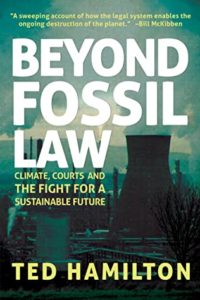
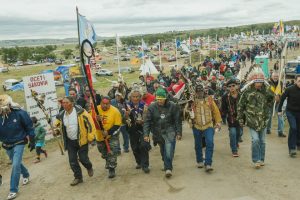
Beyond Fossil Law: Climate, Courts, and the Fight for a Sustainable Future
The technology exists to halt and reverse the ongoing catastrophe of climate change. What is lacking is the political will to do it.
It is legal in the United States to put millions of tons of poison into the air but it is illegal to disrupt this ecocide. Our courts and Congress defend this ecocide. What is to be done?
In 2016, four people known as “the valve turners“ shut down four pipelines in the states of Washington, Montana, Minnesota, and North Dakota. They were arrested and tried. How did the valve turners defend themselves? They mounted the defense of necessity.
The necessity defense is the legal concept that a person can commit a minor crime in order to prevent a larger one. In this case the valve turners admitted to trespass on oil pipeline company property in order to prevent their ongoing contribution to the crisis of climate change.
Guest – Attorney Ted Hamilton, author of the just-published book, “Beyond Fossil Law: Climate, Courts, and the Fight for a Sustainable Future.“ Bill McKibben describes Ted Hamilton book as “a sweeping account of how the legal system enables the ongoing destruction of the planet.“. Ted Hamilton is a climate movement lawyer, writer, and literary scholar. After law school, he co-founded the Climate Defense Project, which provides legal assistance to climate justice activists including the valve turners. He lives in Worcester, Massachusetts.

—————————————-
Civil Liberties, Climate Change, Human Rights, Iran, Supreme Court, Truth to Power, War Resister
Podcast: Play in new window | Download
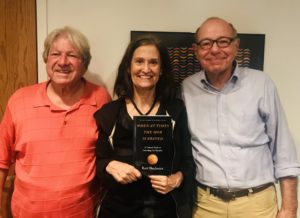
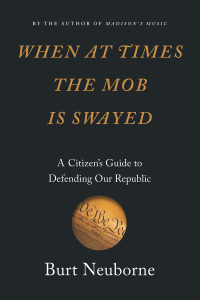
When at Times the Mob Is Swayed, A Citizen’s Guide to Defending Our Republic
Trump was elected by about 25% of the eligible voters. Half of the voters who could have, didn’t vote. He lost the popular election by 3 million votes. Since then, this appalling man has proceeded to aggrandize his power. Backed by large corporations to whom he gave huge tax breaks and for whom he cut regulations, the military to which he just gave a $750 billion budget, a Republican Supreme Court and the right wing media such as Sinclair Broadcasting and Fox News he has maintained a steady base of support in the population.
Increasing a sense of dread has spread across our country, it appears possible that Trump may get reelected. Democracy and the rule of law are increasingly threatened.
Guest – Constitutional Lawyer, Burt Neuborne is the former legal director of the American Civil Liberties Union and has argued many cases before the US Supreme Court. Attorney Neuborne’s book “When at Times the Mob is Swayed” has been recently published by the New Press. He is currently the Norman Dorsen Professor of Civil Liberties at NYU School of Law.
—-
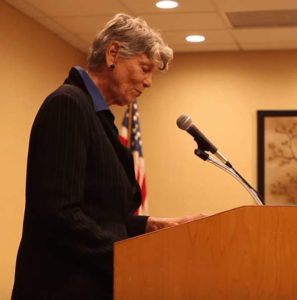
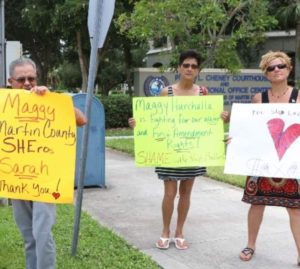
Prominent Environmental Activist Maggy Hurchalla Loses Appeal Of 4.4 Million Dollar Jury Verdict
Issues of the environment, citizen advocacy, and the public’s right to know are converging in two South Florida court cases. One involves 78-year-old Maggy Hurchalla, a former Everglades Coalition’s Conservationist of the Year and winner of a National Wetlands Award from the Environmental Law Institute. Now she owes a developer $4.4 million for speaking out about a critical local environmental issue.
In 2012 Hurchalla learned that Lake Point Restoration was considering conveying water to West Palm Beach for a fee. She complained about the company’s operation in emails to Martin Country commissioners and after Lake Point lost out on some contracts. Lake Point claims Maggy lied and was intent on hurting the company.
In a second related case, the nonprofit Everglades Law Center requested a transcript of a closed door meeting of South Florida Water Management’s governing board. The response? They were hauled into court, with Maggie Hurchalla added to the lawsuit.
Guest – Professor Richard Grosso, director of environmental and land use practice at NOVA Southeastern University. Professor Grosso is a widely recognized legal expert, practicing attorney and policy advocate, with over 30 years of experience litigating and advocating on statewide and south Florida environmental issues.
——————————

——————————

























